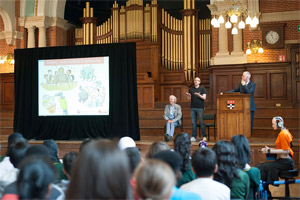Pupils get hands on with robots, god and genetic engineering
Release Date 25 June 2013

The University of Reading's Institute of Education welcomed 300 pupils and teachers from 13 schools this week in a unique partnership with science and religious education secondary departments.
Pupils from across the UK gathered at the Institute's ‘Robots, God and Genetic Engineering' workshop which was opened by the University's Vice-Chancellor. The day was scheduled to include acclaimed scientists from a number of universities, including Reading, who explored stem cells, robotics, ethics and philosophy with their young guests. Workshop sessions included building robots, cloning cauliflowers and discussion about the brain, the mind and free will.
Organiser, Dr Berry Billingsley, Senior Lecturer in Science Education at Reading's Institute of Education said: "We are becoming increasingly aware as a training institution, that the pressure is growing on teachers nationwide to deliver globally and scientifically aware future citizens.
"Proposed new GCSEs are likely to have a heavy focus on genetics and evolution is likely to be part of the Primary School science curriculum for the first time. So it's not a surprise that we have been inundated by schools from across the country wanting to take advantage of our free workshop, that sets out to nurture pupils to ask not only ethical questions but also bigger questions about life and what medical science can do for us and to us."
Professor John Bryant, a speaker on genetic engineering and bioethics, Dr Nick Hawes from Birmingham's Intelligent Robotics Lab with robot ‘Dora the Explorer', Professor Kevin Warwick, cybernetics expert and inventor of the robot rat, complemented a frenzied day of activities for the enthusiastic teenagers.
Tim, 15, from City of Norwich School mused: "Although I googled the event the day before I wasn't really sure what the day would bring. Now my head is buzzing with even more questions then I came with. I really want to know more about programming now, because I can see what I can do with it. It's really made me think about and all the things I could do with my GCSE choices this year. "
Delamram, 14, from Bentley Wood High School in Harrow was already full of ideas: "I was amazed by the sophistication of the robots on show. I imagine reasoning robots in the future to make our world more efficient than it is now. I would really like to talk to my friends about what I've seen today. I belong to a student society at school and today has made me want to plan a ‘science@school' day to tell people about what we've seen and learnt."
Some teachers also felt they had learnt from the day. Rob, a science teacher at Shire Oak Academy, Brownhills, Walsall said: "Our academy is science based and our aim is to focus on the gifted and talented. Today's workshop has not only opened our pupils' eyes, but has made me think about all the ways our staff can get young people to engage in learning. The most significant part of today's invitation is how many pupils have told me that they don't think that going to University is boring anymore. That's a really valuable aspiration to work towards."
This is the second event at the Institute of Education of its kind and is supported by the Faraday Institute for Science and Religion at Cambridge.
ENDS